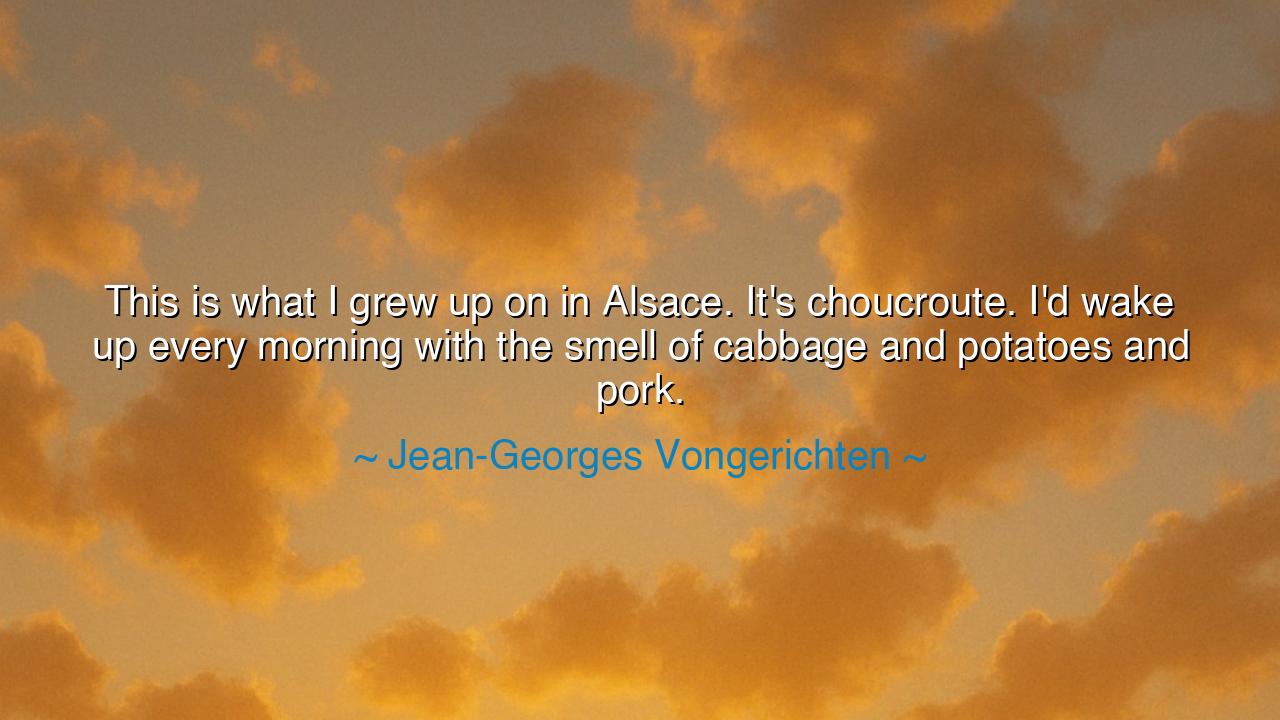
This is what I grew up on in Alsace. It's choucroute. I'd wake
This is what I grew up on in Alsace. It's choucroute. I'd wake up every morning with the smell of cabbage and potatoes and pork.






"This is what I grew up on in Alsace. It's choucroute. I'd wake up every morning with the smell of cabbage and potatoes and pork." These words from Jean-Georges Vongerichten speak to the deep connection between culture, heritage, and food. They evoke the essence of Alsace, a region where food is not merely sustenance but a way of life, a ritual passed down through generations. The mention of choucroute, a dish made from fermented cabbage, potatoes, and pork, captures the intimate relationship between memory, family, and tradition. It is not just a dish but a symbol of Vongerichten’s roots, the very flavors and aromas that shaped his early experiences and connected him to his homeland.
In the ancient world, food was central to identity and community. The Greeks and Romans understood the significance of meals as moments of connection—not only with one another but with the gods. Feasts were not merely about eating but were seen as sacred rituals where the participants shared in the bounty of the earth and honored divine forces. In Homer’s Iliad, the warriors often pause their battles to share a meal, creating bonds that transcend the violence of war. In the same way, Vongerichten’s childhood memories of the smells and tastes of choucroute serve as a deep connection to his heritage, a shared experience with his ancestors, and a form of ritualistic bonding with his family and culture.
Choucroute itself, much like the ancient feasts, is a dish that holds both practicality and symbolism. The use of fermented cabbage and hearty pork speaks to the history of survival, where foods were prepared not just for taste, but to sustain through harsh winters. In ancient times, food preservation techniques like fermentation were critical for survival, allowing families to endure when fresh food was scarce. Just as Roman soldiers carried salted meats and preserved grains to sustain them through long campaigns, so too did the people of Alsace depend on the wisdom passed down through generations to turn humble ingredients into meals that could nourish both the body and the spirit. Vongerichten’s connection to this dish is a testament to how food carries history, tradition, and resilience.
Consider the story of Augustus, the first emperor of Rome, who famously hosted lavish feasts to cement his political alliances and celebrate victories. Meals were his way of communicating power and unity, bringing together people from all walks of life. The Romans understood that food was not just a means of sustenance but an instrument of social cohesion. Similarly, Vongerichten’s recollection of waking up to the smell of choucroute is not just about taste; it’s about the emotional and familial ties that these meals represented. Just as Augustus used feasts to strengthen political bonds, choucroute represents the intimate connection between Vongerichten and his roots, a dish that ties him to his childhood and family.
In modern times, the significance of food as both a memory and a symbol of identity is more relevant than ever. Food culture has become a global language, and chefs like Vongerichten bridge cultures, bringing the flavors of his Alsace upbringing into the world’s kitchens. The story of choucroute, with its earthy roots and rich flavors, is a celebration of heritage. For Vongerichten, as for many, the food he grew up with shapes his identity, grounding him in a shared tradition that transcends the physical ingredients and becomes a part of his creative expression. Just as ancient cooks passed down recipes from generation to generation, modern chefs carry the mantle of this tradition, adding their own twist while honoring the heritage from which they came.
The lesson in Vongerichten’s words is both personal and universal. Food is not merely something to be consumed; it is a vehicle for connection, a way to understand culture, history, and identity. Savoring the past through the flavors of a dish, like Vongerichten’s memory of choucroute, allows us to connect with the generations before us and pass on the wisdom, traditions, and stories that define who we are. The meals we share with loved ones are more than just nourishment—they are the threads that weave us into the tapestry of history, allowing us to partake in something much larger than ourselves.
As we move through our own lives, let us not forget the power of food to connect us with our roots. Whether we are cooking family recipes, sharing meals with loved ones, or learning the culinary traditions of others, we must recognize that every meal is an opportunity to connect with history, culture, and tradition. By honoring the meals that have shaped us and passed down through generations, we honor the lives of those who came before us, ensuring that their legacy continues in the flavors we cherish and the stories we share. Let us, like Vongerichten, find joy and meaning in the simple act of preparing and sharing a meal, remembering that in the smells and tastes of our food, we carry with us the love, wisdom, and strength of generations past.






AAdministratorAdministrator
Welcome, honored guests. Please leave a comment, we will respond soon